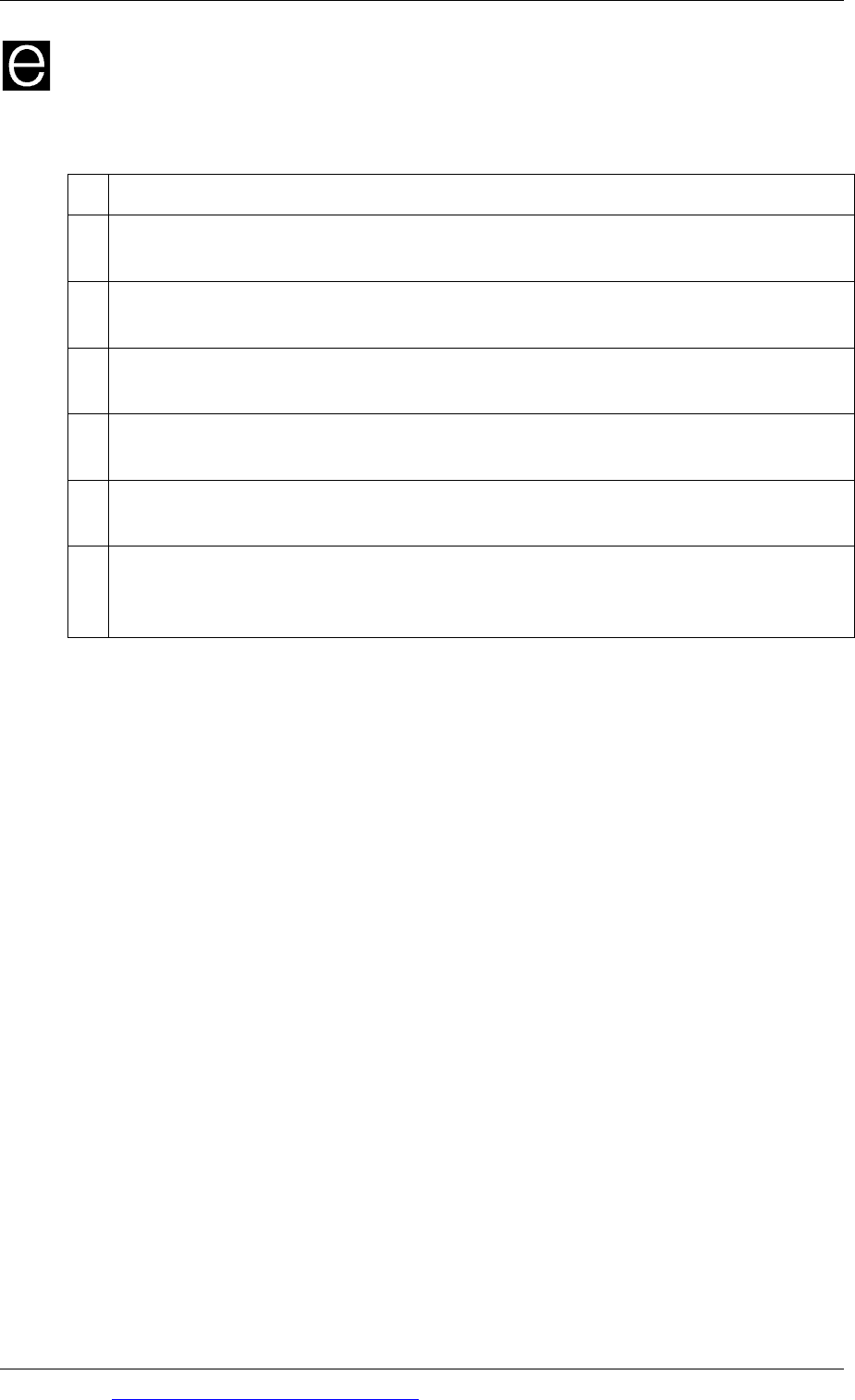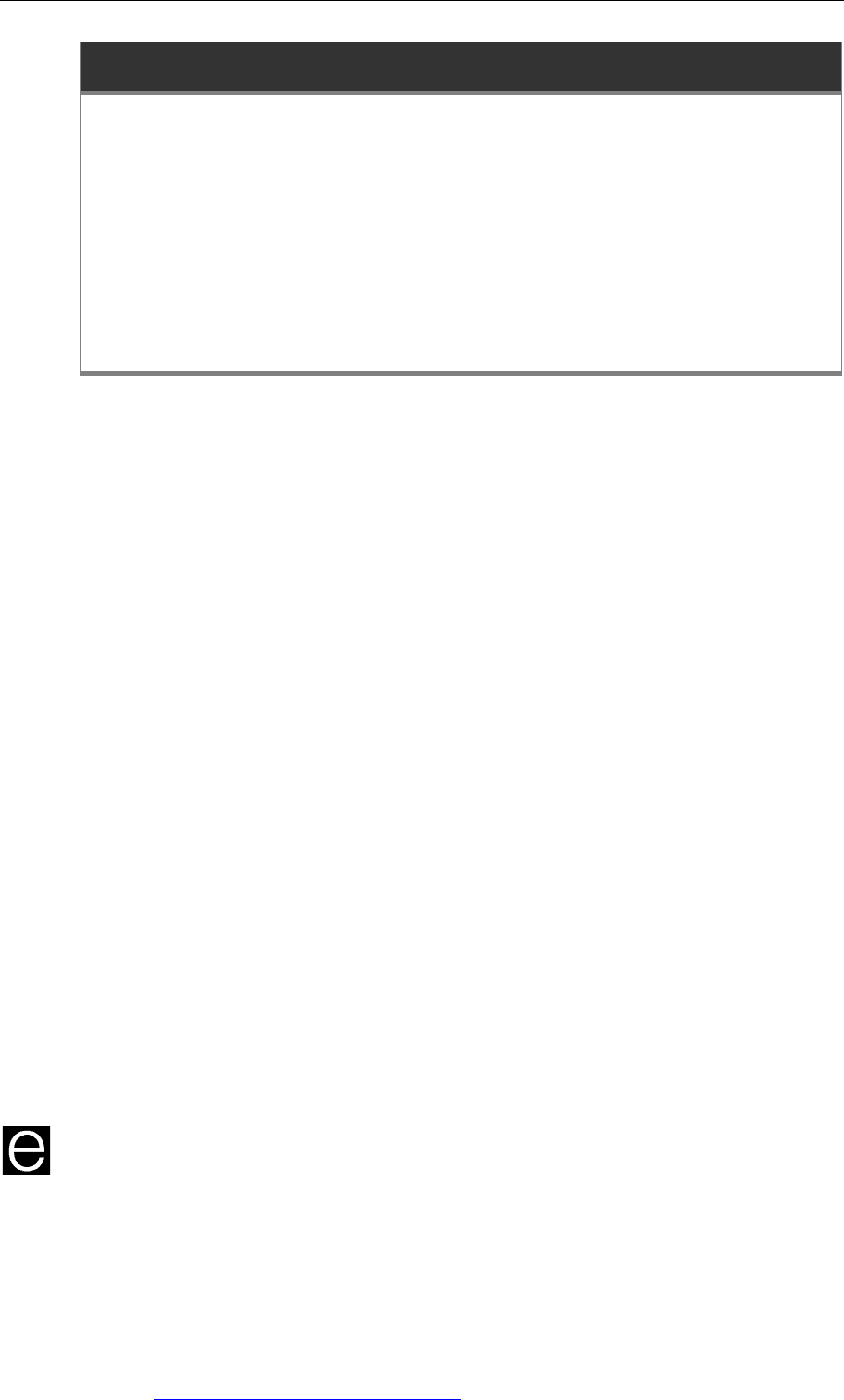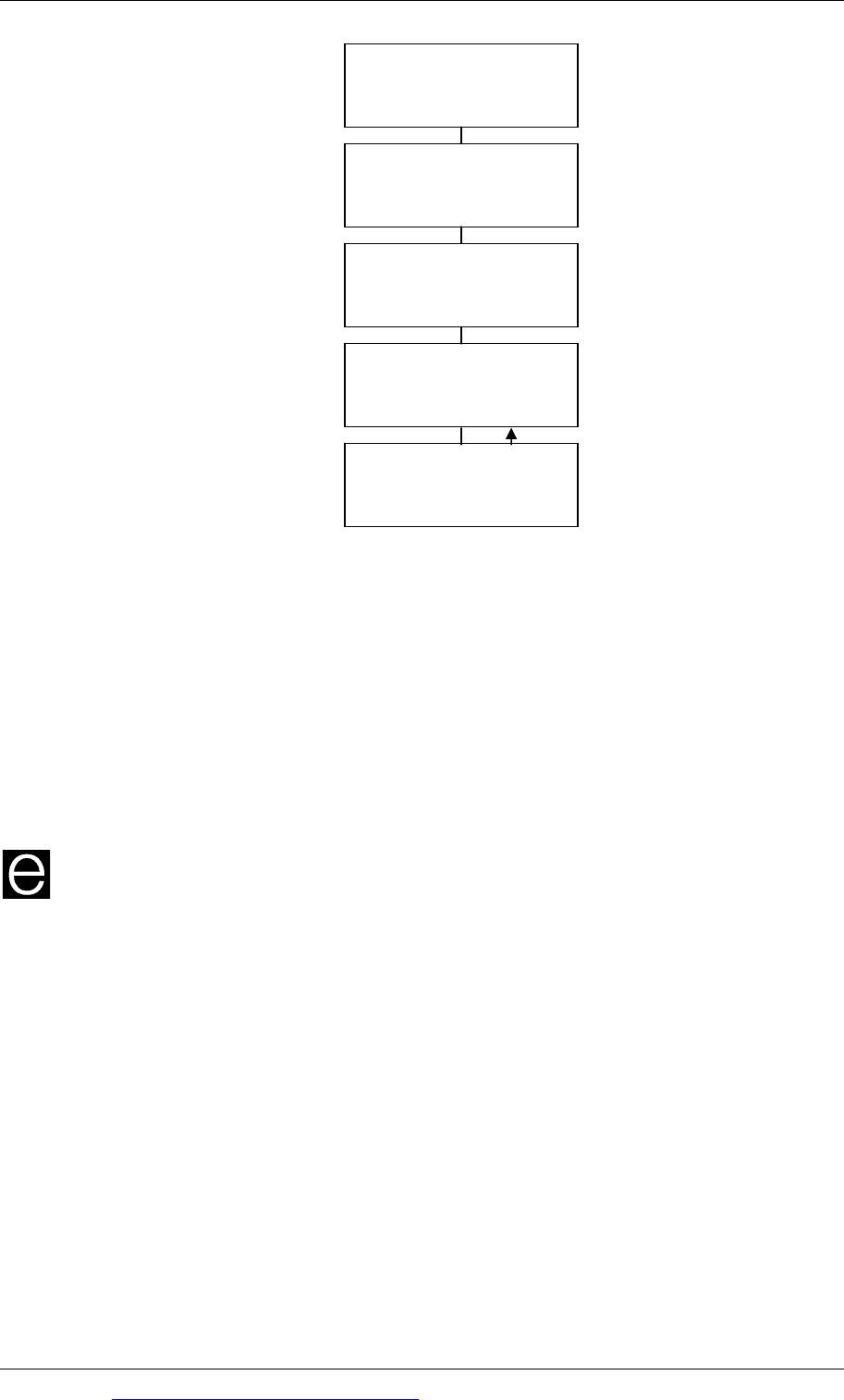ACCA F1 Accountant in Business - 2010 - Study text - Emile Woolf Publishing
Подождите немного. Документ загружается.


Chapter 11: Individual effectiveness and effective communication
© EWP Go to www.emilewoolfpublishing.com for Q/As, Notes & Study Guides 355
Time must be planned for doing work that is important but not urgent. Unless
time is planned and allocated to this work, it will eventually become urgent as
well as important.
Tasks that are urgent but not important include dealing with unexpected
telephone calls where an immediate response is unavoidable, or responding to
some e-mails. Time spent on this work should be controlled and this work
should not be allowed to take up too much time.
Controlling time at meetings
The chairman of a meeting should learn how to control the length of time that
meetings take. Some chairmen of meetings make a point of announcing, when the
meeting begins, when he expects it to end.
Progress at a meeting can be made more quickly:
if the meeting is planned, with an agenda
if relevant information is given before the meeting to all the people who will be
attending it
if the meeting makes use of ‘action points’ and discusses what needs to be done
and the outcome of action points from previous meetings.
3.4 Delegating and time management
Some managers are inefficient and waste time because they fail to delegate enough
work to individuals who report to them. Delegating tasks frees up the manager’s
time.
A manager who has staff to whom work can be delegated should expect to delegate
a substantial proportion of the tasks for which he has responsibility.
3.5 Controlling the work environment
Some individuals make inefficient use of their time because they fail to control the
work environment within which they operate.
Reading and responding to e-mails. Many individuals set their computer so
that they are notified immediately any e-mail message is received, and they take
time to read it (and possibly respond to it) – no matter how unimportant the
message might be. It has been suggested that large amounts of time could be
saved by not reading e-mail messages immediately, but allocating some time
during the day to read and respond to messages that have accumulated in the
in-box.
Filing. Data and documents should be filed in a logical filing system, so that
they can be found immediately when required. Some individuals spend time
looking for data or documents that they have mislaid.
Keeping a tidy desk. Some writers on time management argue that keeping a
tidy desk, with few items on the desk top, promotes efficiency and better use of
time.

Paper F1: Accountant in business
356 Go to www.emilewoolfpublishing.com for Q/As, Notes & Study Guides © EWP
Example
Various writers and trainers on time management have suggested guidelines or
principles for effective time management. Here is one such list of seven rules.
1 Identify your personal and work-related priorities.
2
Convert these priorities into concrete goals for achievement, divided if necessary
into component activities.
3
Set deadlines or intermediary time limits (‘milestones’) for achieving these tasks
or components of tasks.
4
Think of a monthly calendar, diary or planning notebook as a time-saving
device. Mark important dates in the calendar.
5
Learn to say ‘No’ to opportunities and requests that will use up your time but
will not move your work forward towards its objectives.
6
Identify your own personal barriers to the effective use of your time. What
causes your resistance to time management?
7
Try to achieve a balance in your work between ‘doing’ and ‘being’ – you need
time to be yourself and have some enjoyment from your work. ‘Doing’ all the
time does not provide enjoyment.

Chapter 11: Individual effectiveness and effective communication
© EWP Go to www.emilewoolfpublishing.com for Q/As, Notes & Study Guides 357
Coaching, mentoring and counselling
Coaching
Mentoring
Counselling
The need for counselling at work
The benefits of offering a counselling service
The role of the manager as counsellor
4 Coaching, mentoring and counselling
Individuals are able to improve their personal effectiveness at work through
coaching, mentoring and/or counselling.
4.1 Coaching
Coaching is on-the-job training given to an individual by a person with knowledge
and experience, who might well have been trained in coaching skills. For example,
an individual might be taught how to do the job by an experienced colleague or by a
supervisor. The teacher or coach:
shows the individual how the work should be done
watches the trainee doing the work, and
gives advice and instructions when necessary.
A widely-understood form of coaching outside the work place is being taught how
to drive. Another well-known type of coaching is sports coaching and the use of
‘personal trainers’ for leading sports stars.
There are some advantages of coaching as a method of improving personal
effectiveness.
The coaching is directly related to work and the coach teaches the individual
how the work should be done. When effective, coaching should improve an
individual’s effectiveness in a job very quickly.
The coach can direct his advice at aspects of the work that the individual is not
doing well. This will help the individual to learn more quickly.
4.2 Mentoring
The skills and effectiveness of individuals in their work can be improved by
mentoring. Mentoring means giving guidance and advice.
A mentor is a wise and trusted adviser who gives help to an inexperienced
person.
Mentoring is advice and guidance from a respected person to someone who
needs help.

Paper F1: Accountant in business
358 Go to www.emilewoolfpublishing.com for Q/As, Notes & Study Guides © EWP
Mentoring arrangements can be either informal or formal. A formal mentoring
system is designed to enhance the development of individual employees.
A newcomer to an organisation may be paired with a more experienced person,
who gives guidance and advice, and acts as an example or ‘role model’.
Mentoring may also be used to prepare ‘high-flying’ junior managers for
leadership roles in the future. A junior manager may be attached to a senior
manager, who gives guidance that will help him to develop his management
skills. For top-quality junior managers, mentoring may be provided by the
organisation’s chairman or chief executive officer.
A formal mentoring system may therefore be defined as:
a structured one-to-one relationship that focuses on the needs of the person who
is being mentored, or
a supportive relationship sustained over a period of time between a ‘novice’ and
an ‘expert’, with the intention of supporting the ‘novice’ through a learning
process and helping him or her with career development.
Whereas coaching helps an individual with technical skills, mentoring helps an
individual with management skills. Mentoring encourages individuals to develop to
their full potential. In business organisations, mentoring is particularly valuable in
grooming individuals for senior management positions.
4.3 Counselling
Counselling means providing guidance, advice and support to another person or
group of people. It has been defined by the British Association of Counselling as
follows: ‘People become engaged in counselling when a person occupying, regularly
or temporarily, the role of counsellor offers … time, attention and respect to another
person or persons temporarily in the role of client.’
Counselling may be given to individuals who feel stressed in their work, and the
aim of the counselling would be to reduce the anxiety and depression that the
individual is feeling.
The aim of counselling is to address and resolve specific problems, usually of a
personal nature, where other methods of dealing with the problem have failed or
are non-existent. Discussions during a counselling session should usually be kept
confidential.
The term ‘counselling’ may also be used to describe giving career development
advice or work-related mentoring to a colleague or subordinate. (You should be
prepared to recognise this type of advice within the definition of counselling in
answering any examination question on the topic.)
In a counselling arrangement, one person acts as counsellor to the colleague or
subordinate, and gives up time to discuss that person’s problems or difficulties. The
counsellor needs to be sympathetic, and capable of discussing another person’s
problems and looking for solutions and a way forward. The counsellor must
therefore have a high level of interpersonal skills.

Chapter 11: Individual effectiveness and effective communication
© EWP Go to www.emilewoolfpublishing.com for Q/As, Notes & Study Guides 359
4.4 The need for counselling at work
A need for counselling at work may arise for various reasons:
Problems relating to the individual and his behaviour in work
Problems in the work that are having a demoralising effect on the individual, or
that are causing stress to the individual
Problems that the individual is facing outside work, but that affect his or her
behaviour at work.
Problems relating to the individual and his behaviour in work
An individual’s behaviour in work may become a matter for concern.
An individual may feel depressed in the work he is doing, possibly due to a
sense of frustration or a lack of job satisfaction. He may be wondering whether
he is in the right job. He may be frustrated by a lack of career development and a
sense that there is no point to what he is doing. The individual may welcome
counselling if he is depressed or frustrated.
An individual’s behaviour may be causing annoyance or resentment amongst
work colleagues. For example, an individual may act in a rude manner to
colleagues, or may act in an arrogant manner. His manager may decide to give
him counselling advice if he is annoying his colleagues.
Problems in the work that cause stress
Individuals may benefit from counselling when there are problems in the work that
are causing them stress. Examples of work-related stress are:
having to work continually to deadlines for completing tasks
having to work excessive hours of overtime
not having enough work to do
worrying about the risk of redundancy and what will happen to the job
worrying about having to retire in the fairly near future.
Problems outside work that affect the individual at work
Individuals may have problems outside their work that are still on their mind
throughout the working day. Although the cause of the stress is not work-related,
their work is affected. Examples of these problems are:
problems in a marriage
problems with children
problems with alcohol consumption
problems with taking drugs
problems with excessive debts.

Paper F1: Accountant in business
360 Go to www.emilewoolfpublishing.com for Q/As, Notes & Study Guides © EWP
4.5 The benefits of offering a counselling service
There are several reasons why an organisation should arrange for counselling to
employees suffering from stress, anxiety or depression:
Counselling is an ethical issue. An organisation should offer support to its
employees if it believes that it has a responsibility for their well-being.
Counselling demonstrates a commitment by an organisation to its employees.
A willingness to help employees may result in stronger loyalty from employees
to the organisation.
Counselling is a method of resolving problems. Counselling is often a last resort,
when all other methods of dealing with a problem have failed.
It may be particularly effective in dealing with some types of problem, such as
the worries of employees about their career development, or about retirement or
redundancy.
If counselling succeeds in reducing an employee’s problems, the employee is
likely to perform more effectively at work.
4.6 The role of the manager as counsellor
A large organisation may recognise that many of its employees will inevitably have
problems that they find difficult to resolve, where counselling may help them. It
may therefore employ a small group of full-time counsellors who are available to
discuss certain types of problem that employees are facing, such as problems with
children, marriage and money (personal debts).
However, when an individual’s problems are work-related, or are affecting the
employee’s colleagues, it is often appropriate for the manager to act as counsellor,
because the manager is in a good position to discuss problems that the subordinate
is having with the work, or with his career development.
A problem with managers acting as counsellor, however, is that the relationship
between a counsellor and a client is very different from the relationship between a
manager and a subordinate.

Chapter 11: Individual effectiveness and effective communication
© EWP Go to www.emilewoolfpublishing.com for Q/As, Notes & Study Guides 361
Effective communication
Formal and informal communication in the workplace
The need for effective communication
Communication models
Attributes of effective communication
Barriers to communication
Methods of communication
Patterns of communication: vertical and lateral communication
Other patterns of communication
5 Effective communication
5.1 Formal and informal communication in the workplace
In work, as in all aspects of living, people must communicate. They have to give
instructions, provide information, obtain information, communicate ideas, listen to
the ideas of other people, announce decisions (tell other people what they intend to
do), and so on.
The effectiveness of an organisation depends to a large extent on the effectiveness of
communication by its managers and employees.
Information is exchanged in two ways, formally and informally.
Formal communication is communication that is passed through official
‘channels’ established by the organisation. Examples of formal communication
are reports and instructions by a manager to a subordinate. Formal
communication passes through the formal management structure and ‘chain of
command’. Individuals receive and give information because of their position in
the organisation.
Informal communication is communication between individuals in an
organisation that does not pass through an official channel. Instead, the
information is passed by individuals in general conversation, sometimes as
gossip or as rumour. Often informal communication passes as unofficial e-mails
between colleagues.
Example
Mega Company dismisses its finance director on Monday. It makes a formal
announcement to staff about the dismissal on Friday of the same week. However,
most people had already heard about the dismissal, because the news had been
‘leaked’ and passed from person to person within the organisation.

Paper F1: Accountant in business
362 Go to www.emilewoolfpublishing.com for Q/As, Notes & Study Guides © EWP
In this example, the informal communication system has operated more quickly
than the formal communication. If it is accurate, it is therefore more efficient.
Unfortunately, informal communication may be inaccurate.
Comparison of formal and informal communication
All organisations rely on a mixture of formal and informal communication to operate
effectively.
Formal information is often slow in coming. Organisations therefore often rely on
informal communication for the transmission of information, when the formal system is
slow and bureaucratic, or where senior managers are autocratic and do not believe in
sharing information with subordinates.
Informal information usually passes between individuals very quickly. A problem
with informal information is that management have no control over it. They control
formal communication channels, but not informal communication. With informal
information, it is sometimes a matter of chance who gets the information and who
does not: some individuals might be totally ignorant of what most of their
colleagues already know.
In an effective organisation, there should usually be an efficient formal
communication system, so that accurate information is passed in good time to
everyone who needs it. When formal communication is reliable, relevant and
timely, employees will trust it.
However, even with the most efficient formal communication system, informal
communication systems always exist. People talk to each other unofficially and
socially: they exchange stories, rumours, gossip and so on, and they don’t always
communicate with each other in their ‘official capacity’. Even in their work,
individuals often prefer to communicate informally, in face-to-face conversations, or
by telephone or e-mail, rather than by more formal methods such as memos and
reports.
5.2 The need for effective communication
Effective communication at work is the exchange of information that individuals
need to do their work properly. It needs to be clear (understandable), relevant,
reliable and timely. Effective communication is essential so that:
Instructions and guidelines are properly understood.
Individuals know what they are expected to do.
There is better co-ordination between people and groups in the organisation.
Managers are able to plan and control operations more effectively.
Individuals are more willing to work together in teams or groups, because they
are being told what is happening and where their contribution fits in.
Secrecy, misunderstanding and mistrust are eliminated. Open communication
increases trust.
Arguments and conflicts in the work place are reduced.

Chapter 11: Individual effectiveness and effective communication
© EWP Go to www.emilewoolfpublishing.com for Q/As, Notes & Study Guides 363
5.3 Communication models
Communication models are sometimes used to study the effectiveness of
communication. A problem in organisations is often that communication is
ineffective or inefficient. People do not receive the information they need, or they
get the information too late. In many cases, the person receiving information or an
instruction misunderstands what the sender of the message is trying to say.
Effective communication occurs when the receiver of information gets the
information from the sender, and understands completely what the sender of the
message intended.
Communication models can be used to look at the reasons for ineffective
communication, or what is needed to make communication more effective.
Early communication models
Early communication models were developed in the 1930s to understand the
effectiveness of political propaganda. These models are simple, but still relevant.
A simple communication model considers the following elements in communicating
an item of information or a decision:
Who sends the information? This is the ‘source’ of the communication.
What is the content of the information? This is the ‘message’. What does the
message say?
By what method has the information been given or sent? What is the channel of
communication? Has the information been given verbally, in a face-to-face
discussion or by telephone? Has it been sent by e-mail or by letter? Is it in a
report? Is it in a published book or journal? Television? Radio? Web site?
Who is the information sent to? This is the ‘destination’ of the information.
What effect has the communication had on the recipient? Is this the intended
effect?
Does the sender of the message expect any response to the message? If so, how
clear or effective has the response been?
The basic elements in a communication system are shown in the diagram below.
The effectiveness of a communication system depends on the effectiveness of each
element in the system.

Paper F1: Accountant in business
364 Go to www.emilewoolfpublishing.com for Q/As, Notes & Study Guides © EWP
Feedback
In the context of a communication model, feedback involves the recipient of a
message confirming with the sender of the information that he has got the message,
and checking that he has understood the message correctly. The sender of the
message is able to confirm that the recipient has understood it properly, or can try
to correct any misunderstanding.
The value of this model is that it is possible to look at the causes for ineffective
communication by looking at each element in the communication.
Example
Manager X, sent an e-mail message to a subordinate Y, giving him some information
and asking him to carry out a particular task. Subordinate Y did not do what
manager X wanted.
To find out why the instruction was not followed, we can look at each element in
the communication link:
Was the instruction not followed because manager X did not actually send it?
Was the instruction not followed because subordinate Y did not read his e-mail
messages, or because the e-mail system was not working?
Was the instruction not followed because the content of the message from
manager X was unclear or misleading?
Was the instruction not followed because subordinate Y did not understand
what manager X was telling him to do, even though the message was clear?
Feedback
Source
Message
Channel
Destination
Effect: intended and actual
